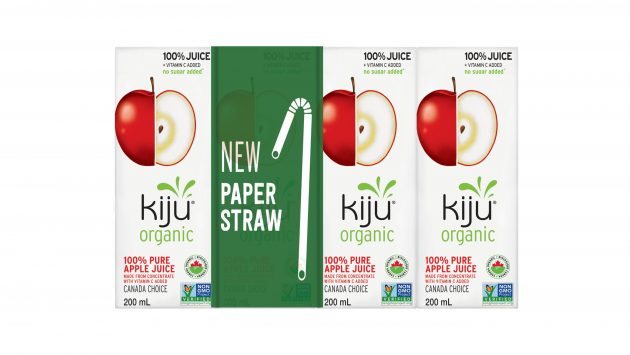
Lassonde launches paper straws and recyclable packaging for beverage products
by CM Staff

The paper straws are made from FSC-certified paper

Kiju brand apple-flavoured juices in individual 200 mL sizes with a new bendable paper straw
PHOTO: Lassonde Industries Inc.
ROUGEMONT, Que. — Lassonde announced that bendable paper straws will replace plastic straws in all 200-ml single-serve boxes of Kiju and Simple Drop Natural Spring Water products. This initiative will provide consumers with 100% recyclable packaging.
“Adding paper straws to two of our brands is an important step for Lassonde to make our packaging even more eco-friendly,” said Jean Gattuso, President and COO of Lassonde Industries Inc. in a prepared statement. “The market testing we did in fall 2019 on adding paper straws to our 200-ml containers showed consumer interest for innovative packaging. We’re pleased to offer consumers 100% recyclable packaging made largely from renewable material.”
The paper straws are made from FSC-certified paper, according to a company statement.
In May 2020, Sustana Fiber’s mill in Lévis, Québec, announced a Canadian first with the development of new processes to recycle multilayer juice and milk cartons. It can now annually process 3,000 to 4,000 tons of these cartons collected from across the country. The replacement of plastic straws will increase the percentage of recyclable fibre and supply the new facility in Lévis.
“Each recycled multilayer carton provides the raw material needed to continue producing essential items like toilet paper and paper napkins.” said Isabelle Faucher, managing director of the Carton Council of Canada. “Stable and thriving end-markets for post-consumer cartons are important to the success of national recycling and recovery efforts. Increased carton recycling helps preserve natural resources, meet important diversion and recycling goals, create jobs and, in the case of COVID-19, helps to avoid shortages of the pulp needed to manufacture essential items.”